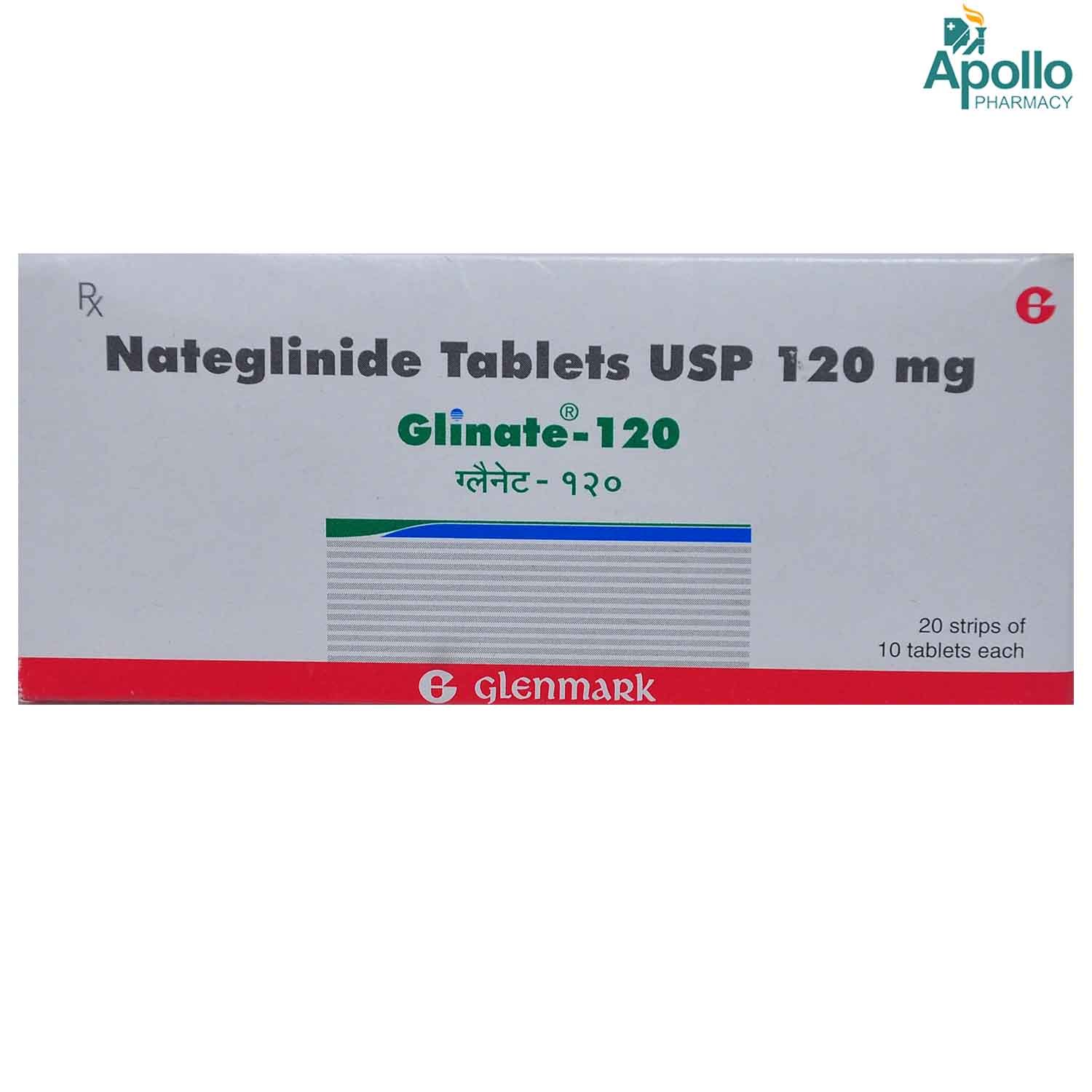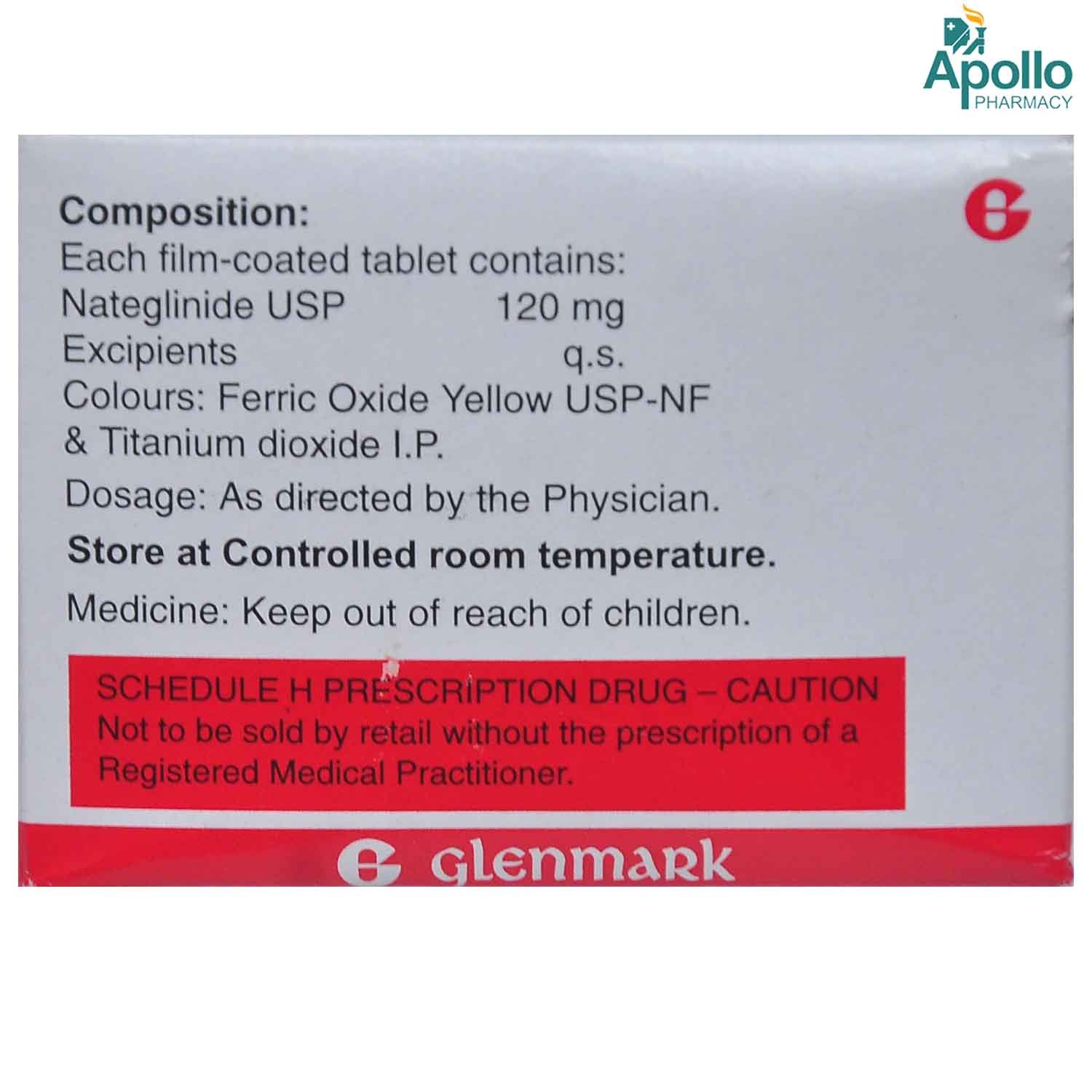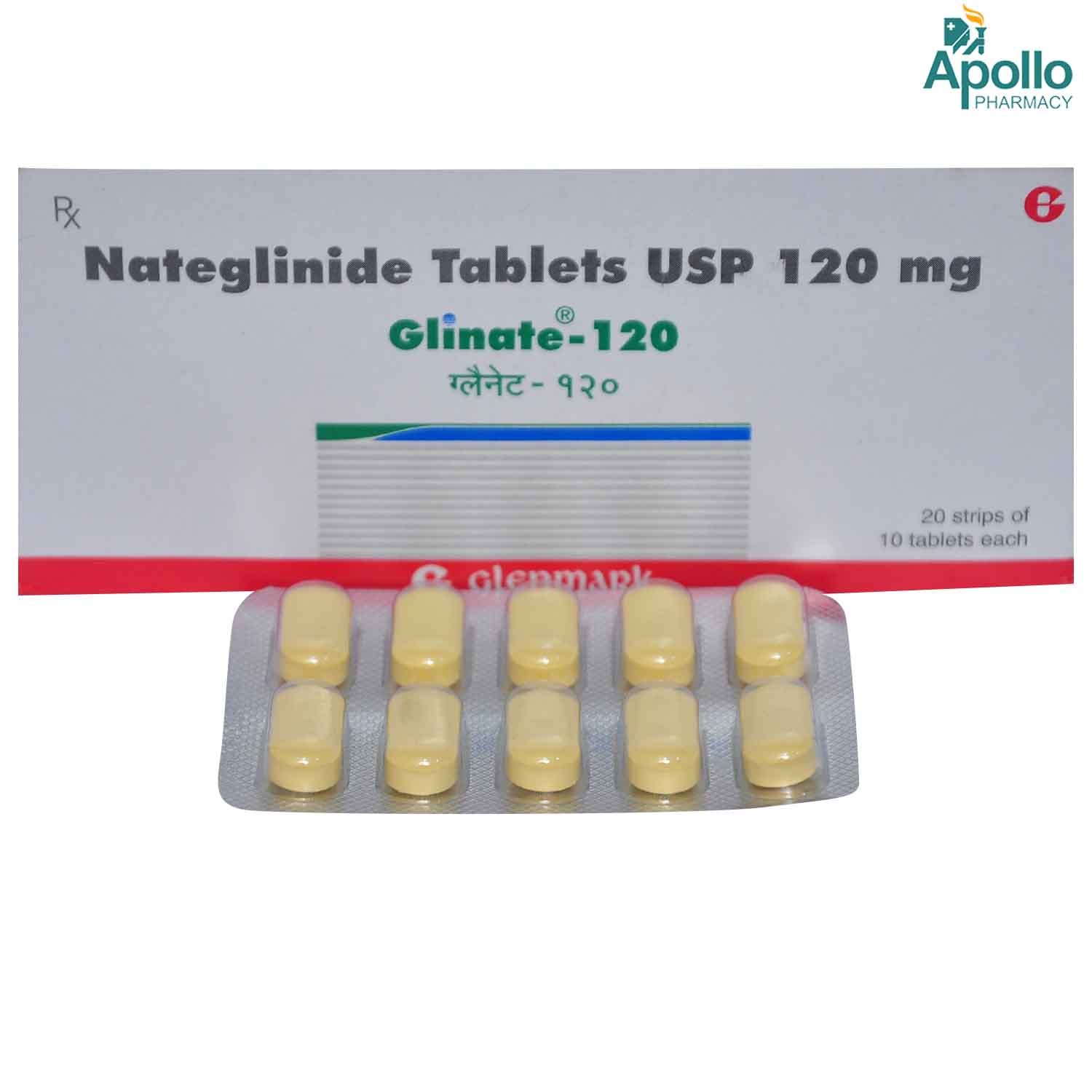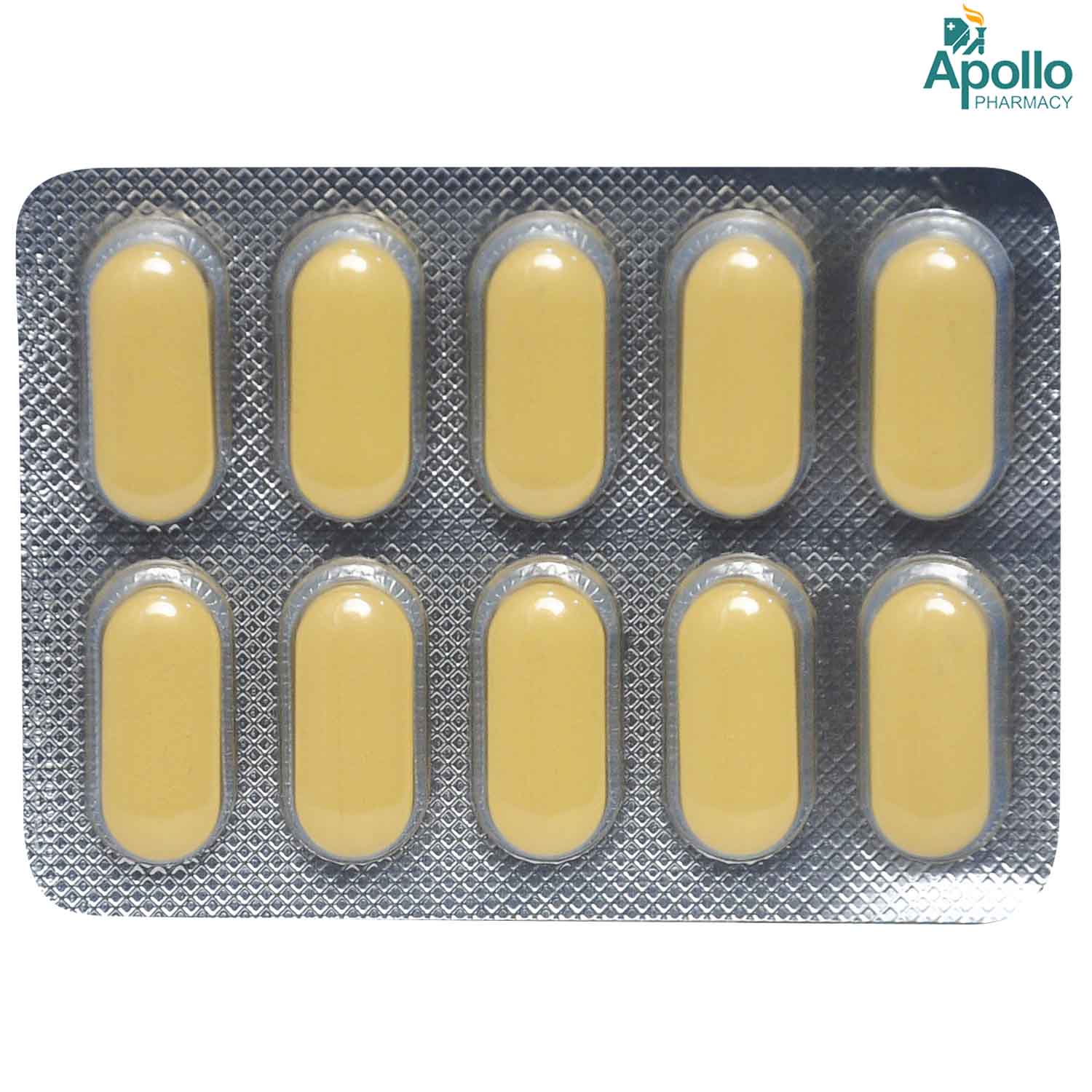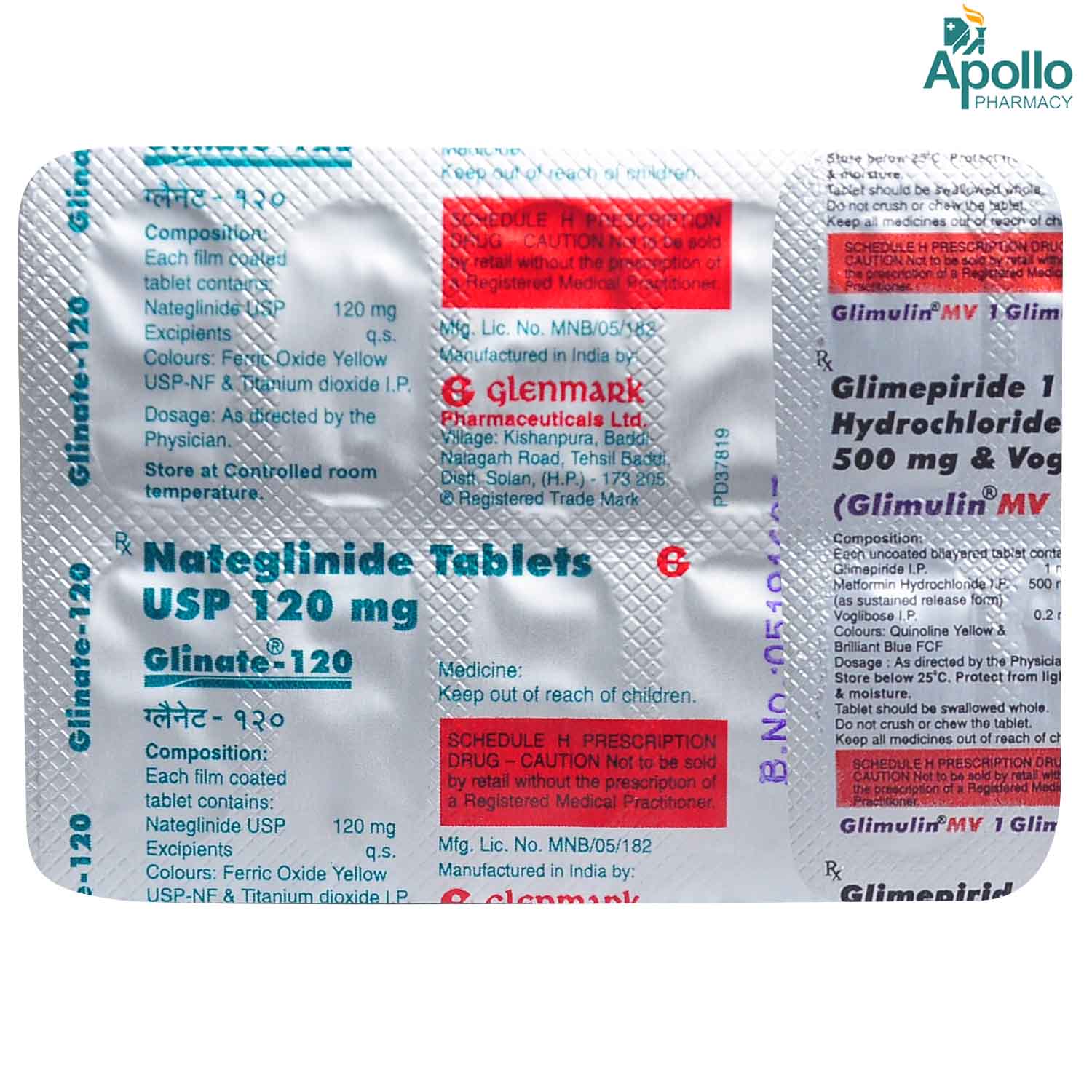Glinate 120 Tablet 10's
MRP ₹188.5
(Inclusive of all Taxes)
₹28.3 Cashback (15%)
Provide Delivery Location
Online payment accepted
 Prescription drug
Prescription drugWhats That
Composition :
Manufacturer/Marketer :
Consume Type :
Expires on or after :
Return Policy :
About Glinate 120 Tablet
Glinate 120 Tablet belongs to the class of medications called oral antidiabetics. It is an oral hypoglycaemic (lowering blood sugar) medication intended for people with type 2 diabetes; proper diet and exercise control blood sugar. It is used when diet, exercise, and weight reduction alone have not been found to control blood sugar well enough. Type 2 diabetes is a chronic or lifelong disorder affecting how our body processes glucose. People with type 2 diabetes either do not produce enough insulin or cannot perform their body functions (insulin resistance). Middle-aged or older individuals are most likely to suffer from type 2 diabetes, also known as adult-onset diabetes.
Glinate 120 Tablet is prescribed alone or combined with other medications to treat type 2 diabetes. Glinate 120 Tablet lowers blood glucose levels by stimulating the release of insulin from the pancreas.
Take Glinate 120 Tablet as prescribed by your doctor. Take Glinate 120 Tablet preferably before meals; its effect may be delayed if it is taken with or after meals. You are advised to take Glinate 120 Tablet for as long as your doctor has prescribed. You may experience sweating, dizziness, shaking, hunger, tiredness, diarrhoea, and abdominal pain. One may experience these symptoms due to the lack of proper food intake or a high dose of anti-diabetic medicine. If you experience low blood sugar symptoms, eat or drink something containing sugar as advised by your doctor. Most of these side effects of Glinate 120 Tablet do not require medical attention and gradually resolve over time. However, if the side effects are persistent, reach out to your doctor.
Glinate 120 Tablet should not be stopped even if you feel better, without consulting your doctor as sugar levels keep changing. If you stop taking Glinate 120 Tablet abruptly, it may increase your sugar levels. Glinate 120 Tablet should not be taken if you have type 1 diabetes or severe kidney or liver disease. Do not take Glinate 120 Tablet if you are pregnant or planning to become pregnant or if you are a breastfeeding women. It is also not recommended for use in children and adolescents (under 18 years of age). Speak to your doctor for information regarding this medicine.
Uses of Glinate 120 Tablet
Directions for Use
Key Benefits
Glinate 120 Tablet belongs to the class of medications called oral antidiabetics. It is an oral hypoglycaemic (lowering of blood sugar) medication intended to use in people with type 2 diabetes; proper diet and exercise to control blood sugar levels in the blood. It is used when diet, exercise, and weight reduction alone have not been found to control blood sugar well enough. Glinate 120 Tablet is known to lower blood glucose levels by stimulating the release of insulin from the pancreas. Glinate 120 Tablet has unique pharmacokinetic properties, and it will be absorbed rapidly and extensively from the small intestine after oral administration. It is also effective as a combination therapy with metformin for patients who require therapy to reduce both fasting and postprandial blood sugar (hyperglycemia).
Storage
Drug Warnings
Glinate 120 Tablet should not be taken if you are allergic to Glinate 120 Tablet or any of its ingredients. Do not take Glinate 120 Tablet if you are pregnant or breastfeeding women, have type 1 diabetes, or have a severe liver problem. Take Glinate 120 Tablet with caution if you are over 65 years old, undernourished, or have an underactive pituitary or adrenal gland. Watch carefully if you have any signs of low blood sugar. Avoid drinking alcohol while on this medication, as it affects blood sugar levels. Inform your doctor before taking Glinate 120 Tablet if you have a severe kidney/liver problem, have recently met with an accident, or have an active infection. Glinate 120 Tablet is not recommended for children and adolescents (below 18 years of age). Check your blood sugar levels from time to time, as your doctor advises. Do not drive or operate heavy machinery if you have low blood sugar, as your ability to concentrate or react may be reduced in such a case.
Drug-Drug Interactions
Drug-Drug Interactions
Login/Sign Up
Coadministration of Gatifloxacin with Glinate 120 Tablet may sometimes affect blood glucose levels. Both low blood glucose and, less frequently, high blood glucose have been reported.
How to manage the interaction:
Co-administration of Gatifloxacin with Glinate 120 Tablet can result in an interaction, but it can be taken if your doctor has advised it. Consult the prescriber if you experience symptoms such as nervousness, confusion, headache, dizziness, drowsiness, tremors, nausea, hunger, weakness, perspiration, palpitation, rapid heartbeat, increased urination, increased thirst, and increased hunger. If you have diabetes and are taking fluoroquinolones, it's important to maintain your blood sugar levels. Do not stop using any medications without talking to a doctor.
Blood glucose levels can be affected by levofloxacin when taken in conjunction with Glinate 120 Tablet. They may cause hyperglycemia (high blood glucose) and, less commonly, hypoglycemia (low blood glucose).
How to manage the interaction:
Although concomitant administration of levofloxacin with Glinate 120 Tablet can result in an interaction, they can be taken if a doctor has advised it. Inform doctor if you experience hypoglycemia (low blood glucose) or hyperglycemia (high blood glucose), or if you have a lack of blood glucose control. Headache, dizziness, sleepiness, anxiety, confusion, a shaking sensation, nausea, hunger, weakness, sweat, palpitation, and fast pulse are all symptoms of hypoglycemia. Hyperglycemia symptoms may include increased thirst, increased appetite, and increased urine. Do not stop using any medications without talking to a doctor.
Coadministration of Glinate 120 Tablet with ciprofloxacin can affect blood glucose levels. Both hyperglycemia (high blood glucose) and, less frequently, hypoglycemia (low blood glucose).
How to manage the interaction:
Although taking ciprofloxacin and Glinate 120 Tablet together can possibly result in an interaction, it can be taken if your doctor has prescribed it. However, tell your doctor if you have hypoglycemia, hyperglycemia, or a decline in blood glucose control. Hypoglycemia can cause headaches, dizziness, sleepiness, anxiety, disorientation, tremors, nausea, hunger, weakness, sweat, palpitations, and a rapid heartbeat. Increased hunger, thirst, and urine are all possible signs of hyperglycemia. It is recommended to maintain blood glucose levels.
Co-administration of Ofloxacin and Glinate 120 Tablet can sometimes have an effect on blood glucose levels.
How to manage the interaction:
Although combining Ofloxacin and Glinate 120 Tablet can lead to an interaction, they can be taken on the doctor's advice. If you experience any symptoms of hypoglycemia (headache, dizziness, sleepiness, nervousness, confusion, shaking, nausea, hunger, weakness, sweat, palpitation, and rapid heartbeat) or hyperglycemia (increased thirst, hunger, and urination), consult a doctor. Keep an eye on your blood glucose levels. Do not discontinue any medications without consulting a doctor.
Coadministration of Glinate 120 Tablet with Moxifloxacin can affect blood glucose levels.
How to manage the interaction:
There may be a possibility of interaction between Moxifloxacin and Glinate 120 Tablet, but it can be taken if prescribed by a doctor. Consult a doctor if you experience headache, dizziness, rapid heartbeat, increased thirst, and increased urination contact a doctor. Do not stop using any medications without a doctor's advice.
Glinate 120 Tablet with tirzepatide may increase the risk of low blood sugar, necessitating regular monitoring or dose adjustments. Headache, lightheadedness, drowsiness, anxiety, disorientation, trembling, nausea, weakness, sweating, palpitations, and a fast heartbeat are some of the symptoms.
How to manage the interaction:
Consult doctor when experiencing headache, lightheadedness, drowsiness, anxiety, disorientation, trembling, nausea, weakness, sweating, palpitations, and a fast heartbeat are some of the symptoms when co-administering Glinate 120 Tablet and Tirzepatide.
Drug-Food Interactions
Drug-Food Interactions
Login/Sign Up
Diet & Lifestyle Advise
- Fill your half plate with starchy veggies, a quarter with proteins and a quarter with whole grains. Eat at regular intervals. Do not take a long gap between a meal or snack.
- Monitor your blood sugar level regularly, especially when there are lots of fluctuations.
- Invest in at least 150 minutes of moderate-intensity physical activity or one hour and 15 minutes of high-intensity exercise weekly.
- Replace refined carbohydrates containing whole-grain foods and increase the intake of fruits, veggies, and other fibre-enriched foods.
- Reduce saturated fat intake (or hidden fats) in food like chips, crisps, pastries, biscuits and samosas. Choose omega-3 fatty acid-containing oils for daily cooking.
- Do not take stress as it may elevate your blood sugar level. You can adopt stress management techniques like mindfulness to control stress-related blood sugar changes.
- Opt for low-fat dairy products (low-fat yoghurt, fat-free milk, cheese, etc.).
- Include foods rich in healthy carbohydrates and fibre, fruits, whole grains, and vegetables in your diet.
- Try eating food at regular intervals. Do not skip meals. Also, try not to overeat.
- Maintain a healthy weight by exercising regularly.
- Rest properly, and avoid stress by doing meditation or yoga.
Side Effects of Glinate 120 Tablet
- Abdominal pain
- Indigestion
- Diarrhoea
- Nausea
Habit Forming
Therapeutic Class
All Substitutes & Brand Comparisons
RX
Out of StockNatstar 120mg Tablet
Ipca Laboratories Ltd
₹80
(₹7.2 per unit)
57% CHEAPERRX
Out of StockNateron 120mg Tablet
₹97
(₹8.73 per unit)
48% CHEAPERRX
Out of StockGLINATE TM 120MG TABLET
Glenmark Pharmaceuticals Ltd
₹172
(₹15.48 per unit)
8% CHEAPER
Drug-Diseases Interactions
Drug-Diseases Interactions
Login/Sign Up
FAQs
Drug-Drug Interactions Checker List
- ASPIRIN
- SITAGLIPTIN
- LINAGLIPTIN
- LIRAGLUTIDE
- METOPROLOL
- ALBUTEROL
- FUROSEMIDE
Disease/Condition Glossary
Type-2 diabetes mellitus: Type 2 diabetes is a chronic condition that occurs when our body becomes resistant to insulin or when the pancreas cannot make enough insulin. Insulin is the hormone that controls sugar levels in your blood. People with type 2 diabetes either do not produce sufficient insulin or cannot perform its function in the body (insulin resistance). Middle-aged or older individuals are most likely to suffer from type 2 diabetes, called adult-onset diabetes. Genetics and environmental factors seem to be contributing factors for type 2 diabetes. People with type 2 diabetes will have high blood sugar levels (hyperglycemia) in the blood. They will experience symptoms include increased thirst, frequent urination at night, slow wound healing, increased hunger, fatigue, and blurred vision. There may be weight gain in some cases, while weight loss may also be observed in rare cases. The complication associated with type 2 diabetes includes neuropathy (nerve problems), nephropathy (kidney problems), and retinopathy (damaged retina of eyes or blindness), sexual dysfunction and increase the chance of heart attack or stroke.

Have a query?
Alcohol
Safe if prescribed
Alcohol may disturb the control of blood sugar level. Alcohol should not be consumed along with Glinate 120 Tablet as it is known to interact and lead to unpleasant side effects.
Pregnancy
Consult your doctor
Pregnancy Category C: There are no adequate and well-controlled studies in pregnant women. It is unknown whether Glinate 120 Tablet can cause fetal harm when administered to a pregnant woman. It should not be used in pregnant women.
Breast Feeding
Consult your doctor
Do not take Glinate 120 Tablet if you are breast-feeding. Not enough scientific data available for Glinate 120 Tablet , hence it is best to consult a doctor.
Driving
Safe if prescribed
Your driving may be affected if your blood sugar levels are too high or too low. Do not drive or operate machinery if you may experience dizziness or drowsiness.
Liver
Consult your doctor
Glinate 120 Tablet to be taken with caution, especially if you have a history of liver diseases/conditions. The dose may have to be adjusted by your doctor.
Kidney
Consult your doctor
Glinate 120 Tablet to be taken with caution, especially if you have a history of Kidney diseases/conditions. The dose may have to be adjusted by your doctor.
Children
Safe if prescribed
Glinate 120 Tablet is not recommended for use in children and adolescents (below 18 years of age). Safety and effectiveness have not been established in this age group.

